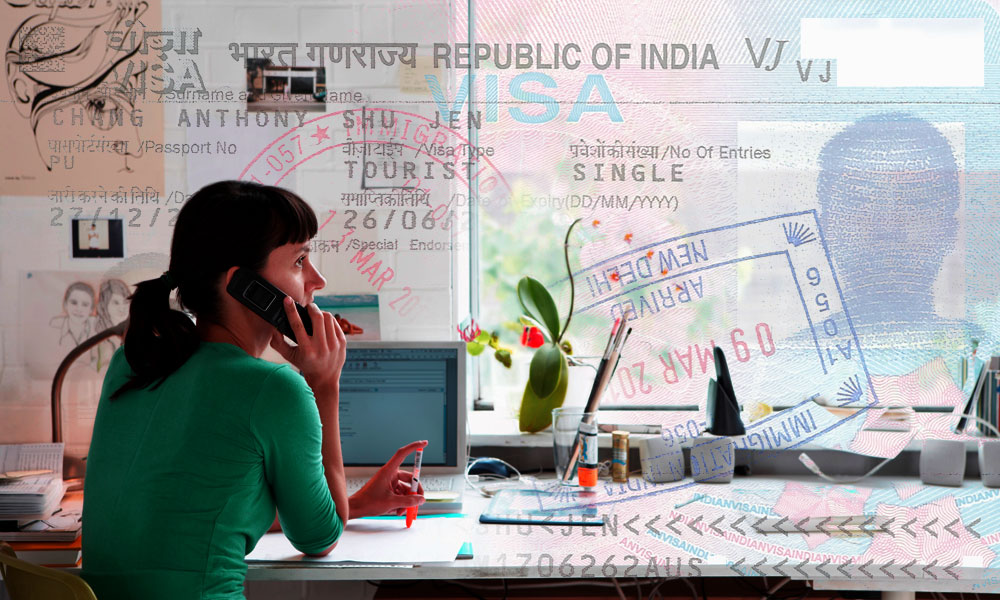Are you ready to take your business ventures to the next level in India? Securing a business visa is the first step towards making your dreams a reality. Navigating the application process can be overwhelming, but fear not! Our expert tips and tricks will help you breeze through the process with ease. Say goodbye to stress and hello to success as we guide you through everything you need to know for a smooth business visa application in India. Let’s get started on turning your entrepreneurial visions into a thriving reality! BUSINESS VISA FOR INDIA
Different Types of Business Visas Available
The process of obtaining a business visa for India can be complex and overwhelming, especially for first-time applicants. However, understanding the different types of business visas available can greatly simplify the application process. In this section, we will discuss the various types of business visas that one can apply for when planning to conduct business activities in India.
1. Business Visa (B-1): This is the most commonly used type of business visa for individuals who wish to visit India for short-term business purposes such as attending meetings, conferences, or training sessions. The validity period for this visa is usually up to 6 months and it allows multiple entries into India during that time.
2. Employment Visa (E-Visa): This type of visa is specifically meant for individuals who have been offered employment by an Indian company or organization. It is valid for up to 5 years and allows multiple entries into the country. To obtain this visa, applicants must provide proof of employment from their prospective employer in India.
3. Project Visa (P-3/P-4): A project visa is granted to foreign nationals who are assigned to work on a specific project in India by their parent company based outside of India. This type of visa is valid for up to one year and cannot be extended unless approved by the Indian government. INDIAN VISA ELIGIBILITY
4. Internship Visa (I-2): Individuals who wish to participate in an internship program with an Indian company or organization can apply for an internship visa under this category. The duration of this visa is limited to one year and it does not allow any kind of paid employment.
5. Conference Visa: As the name suggests, this type of visa is issued to attend international conferences or seminars held by private organizations or government bodies in India. It allows a maximum stay period of 30 days with single entry only.
6. Film/TV Visa: For those involved in film production or television projects in India, a film/TV visa is required. This type of visa is valid for up to one year and can be extended upon approval from the Ministry of Information and Broadcasting.
7. Medical Visa (M-Visa): This visa is granted to individuals seeking medical treatment in India. It allows a maximum stay period of 6 months with multiple entries and requires proof of medical treatment from a recognized hospital in India.
It is important to note that all business visas have specific requirements and eligibility criteria that must be met by the applicant. It is advisable to carefully review the requirements before choosing which type of business visa to apply for. Additionally, it is recommended to consult with an immigration lawyer or expert who can guide you in selecting the most suitable business visa for your specific needs.
Eligibility and Requirements for a Business Visa in India
India is a fast-growing economy with ample opportunities for foreign businesses to invest and establish their presence. Whether you are planning to attend business meetings, explore potential markets, or simply set up an office in India, you will need a Business Visa. This visa is issued to individuals who intend to visit India for business-related purposes such as attending conferences, conducting trade negotiations, or exploring investment opportunities.
To be eligible for a Business Visa in India, you must fulfill certain criteria set by the Indian government. These requirements include:
1. Valid Passport: You must have a valid passport with at least six months of validity remaining at the time of your intended stay in India.
2. Purpose of Visit: As mentioned earlier, a Business Visa is only granted for specific business activities such as attending meetings or conferences, exploring investment opportunities, setting up an office, etc.
3. Letter from Sponsor/Invitation Letter: A letter from your sponsor or inviting organization in India is essential to support your visa application. This letter should clearly state the purpose of your visit and the duration of your stay.
4. Financial Proof: You must provide evidence that you have sufficient funds to cover your expenses during your stay in India.
5. Proof of Accommodation: Along with financial proof, you must also provide proof of accommodation arrangements during your stay in India.
6. Return Ticket: A confirmed return ticket showing that you have plans to leave the country after completing your business activities is mandatory.
7. No Objection Certificate (NOC): If you are employed by an organization outside of India, you will need to obtain an NOC from them stating that they have no objection to your travel plans and ensure that you will return within the stipulated time period.
8. Vaccination Certificate: A Yellow Fever vaccination certificate may be required if you are traveling from or through countries where this disease is prevalent.
9. Biometric Data: As part of the visa application process, you will be required to provide your biometric data, including fingerprints and a digital photograph.
It is essential to note that these are general requirements for a Business Visa in India. Additional documents may be needed depending on your country of citizenship and the purpose of your visit. It is always advisable to check with the Indian embassy or consulate in your home country before applying for a visa.
Understanding the eligibility criteria and gathering all necessary documents beforehand can streamline your Business Visa application process in India and increase your chances of success.
Common Reasons for Visa Rejection and How to Avoid Them
Applying for a business visa can be a daunting process, especially in a country like India where the requirements and regulations are constantly changing. One of the most frustrating outcomes of the application process is receiving a visa rejection. Not only does it delay your plans, but it also comes with additional expenses and paperwork.
To avoid this scenario, it is important to understand the common reasons for visa rejection and take necessary measures to avoid them. In this section, we will discuss some of these reasons and provide tips on how to increase your chances of getting your business visa approved.
1. Incomplete or Incorrect Documentation: One of the main reasons for visa rejection is incomplete or incorrect documentation. It is crucial to carefully review all the required documents and ensure they are complete and accurate before submitting your application. Missing documents or incorrect information can lead to immediate rejection.
Tip: Create a checklist of all the required documents and double-check them before submission. Seek professional help if needed.
2. Failure to Meet Eligibility Criteria: Each country has its own eligibility criteria for issuing visas, including business visas. Your application may be rejected if you fail to meet these criteria, such as having an insufficient bank balance or lacking proof of ties to your home country.
Tip: Research thoroughly about the eligibility criteria for obtaining a business visa in India before applying. Make sure you have all the necessary evidence to support your application.
3. Previous Visa Rejections: If you have previously been rejected for any type of visa in India, it may raise red flags during your current application process. The Indian government keeps records of previous rejections, which could affect their decision on granting another visa.
Tip: Be honest about any past rejections and provide explanations or additional evidence that could strengthen your case.
4. Suspicion of Fraudulent Intentions: Another reason for visa rejection could be suspicion by immigration officials that you have fraudulent intentions. This could include providing false information, forged documents, or previously overstaying a visa.
Tip: Be truthful and transparent in your application and provide genuine supporting documents to avoid any suspicion of fraud.
5. Lack of Clear Purpose for Travel: A business visa is granted for specific purposes, such as attending meetings, conferences, or exploring business opportunities. If your purpose of travel is unclear or does not align with the category you have applied for, it can lead to rejection.
Tip: Clearly state the reason for your visit and provide supporting documents that demonstrate your intentions.
It is important to thoroughly understand the visa application process and requirements before submitting your application to increase your chances of approval. Avoiding common mistakes and being honest and transparent in your application will go a long way in ensuring a smooth business visa application process in India.
Additional Considerations for Foreign Entre
When applying for a business visa in India, there are certain additional considerations that foreign entrepreneurs should keep in mind to ensure a smooth and successful application process. These considerations take into account the unique challenges and requirements faced by foreign entrepreneurs when seeking to establish or expand their business operations in India.
Firstly, it is important for foreign entrepreneurs to thoroughly research and understand the specific visa category they are applying for. India offers various types of business visas, each with its own set of eligibility criteria and restrictions. It is crucial for applicants to determine which category best suits their purpose of visit and to ensure that they meet all the necessary requirements before submitting their application.
Another key consideration for foreign entrepreneurs is the need for accurate and detailed documentation. As part of the application process, applicants must provide evidence of their business activities, financial stability, travel plans, and other relevant information. It is essential that all documents are authentic, up-to-date, and clearly demonstrate the purpose of the visit. Any discrepancies or inconsistencies may lead to delays or even rejection of the visa.
In addition, it is advisable for foreign entrepreneurs to seek out professional assistance when preparing their application. This can be in the form of a reputable immigration lawyer or an experienced visa consultant who can guide them through the complex procedures involved in obtaining a business visa in India. These professionals can also review all documents and advise on any potential issues that may arise during the processing of the application.
One aspect that cannot be overlooked by foreign entrepreneurs is having a well-defined itinerary during their stay in India. This includes details such as planned meetings with clients or partners, site visits, conferences or seminars attended related to their business activities. Providing a clear itinerary helps strengthen one’s case for being granted a business visa as it demonstrates genuine intentions and purpose behind their visit.
Moreover, it is crucial for foreign entrepreneurs to have sufficient funds available during their stay in India. The Indian government requires proof of financial capability through bank statements or other financial documents. It is recommended to have enough funds for not only the duration of the intended stay but also for any unexpected expenses that may arise.
Last but not least, foreign entrepreneurs should be aware of any potential changes in visa regulations or procedures. The Indian government constantly reviews and updates its policies, and it is important for applicants to stay informed about any relevant changes that may affect their application process.
Foreign entrepreneurs looking to obtain a business visa in India must pay careful attention to these additional considerations in order to increase their chances of a successful application. By thoroughly researching and preparing all necessary documents, seeking professional assistance when needed, having a clear itinerary and sufficient funds, as well as staying updated on any changes in regulations, foreign entrepreneurs can navigate the visa application process with ease and achieve their business goals in India.


